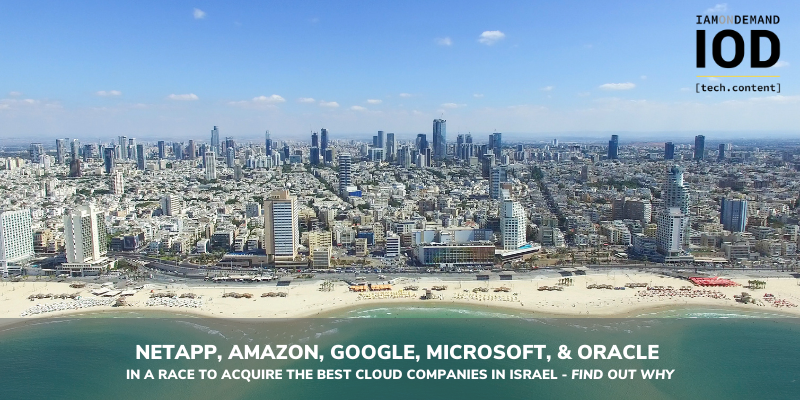A bold statement, for sure, but I’ll prove it.
I was an early adopter of the cloud. I was part of the cloud-leading team at Clicksoftware (NASDAQ: CKSW), running the first deployment of a new SaaS app on the cloud in a form of hosting. AWS had just entered the Israeli market, and I quickly understood the need.
I evangelized to the company leadership, and during one slide presentation to the upper echelons, a VP of Product commented, “This is just a nice packaging for a hosting service like HostGator.” That was the beginning of a years-long argument.
The 2009 book Start-up Nation: The Story of Israel’s Economic Miracle, examined how Israel, a young country with a population the size of the state of New Jersey, achieved economic growth, such that already in that year “63 Israeli companies were listed on the Nasdaq, more than those of any other foreign country.”

Tel-aviv Azrieli Sunset by Ilan Shacham
Back then when AWS was still a young cloud provider, I was proud that Clicksoftware was the poster child for AWS in the region. I bought into cloud computing and became instrumental in leading other Israeli companies into the cloud revolution. I became a cloud evangelist and was a guest speaker at several cloud conferences. After all, I thought, why should a startup company with high operating costs, minimal—if any—revenue, but enormous technological needs, invest immense amounts of money in building their network, when a simple, well-designed product already exists? The cloud. And in 2009, there were already thousands of startups on the scene.
The AWS Israel rep, Dan Feld, wasn’t yet based in Israel, but within two years moved there, because the Israeli market was exploding and a full-time rep was required. AWS conferences were being held in Israel, soon to be followed by conferences by other cloud providers.
At a huge AWS Summit in Tel Aviv in 2019, I met the aforementioned VP of product at Clicksoftware. He was among 5,000 other attendees. We discussed the cloud explosion, and while I referred to my prediction years earlier, I was careful not to brag about it. Imagine, 5,000 attendees in a country of 9 million people. That may not sound like a lot without context: The AWS summit in London the year before had 7,000 people, in a country of 70 million.

AWS Summit In TelAviv
Purchasing Power
Israel is a huge, successful, and esteemed technological hub. It’s no surprise that AWS chose Israel as one its first markets. And the Israeli market is growing at a rapid pace, such that Azure will be setting up a region in Israel in 2021, and Google Cloud Platform and Oracle are following suit. Other world regions include the Behemoths, London, Paris, Beijing, and Hong Kong, and Israel is joining them.
Amazon set up their cloud infrastructure in Israel, and Israel joined only 21 other countries who have AWS data centers—that’s 8% of the countries of the world, of which Israel is one. Today, there are hundreds of people working at AWS in Israel, and they’ve even opened an office space for their customers, called Floor28.
Here are just a few of the major cloud acquisitions over the past few years:
- NetApp acquired Onaro and Spot.io.
- Amazon acquired Cloudendure, Annapurna Labs, and E8 Storage.
- Google acquired Alooma, Elastifile, and Velostrata.
- Microsoft acquired Cloudyn and Adallom (whose CEO went on to become the GM of Israel).
- Oracle acquired Ravello Systems.
And the venture capital and funding rounds keep flowing in, as representatives from world-leading companies look for their next Israeli acquisition.
Cloud Management
Development must be in the cloud. Developing for and using the cloud, requires that testing be in the cloud—local servers aren’t adequate. And by no means is the market limited to working in the cloud. Hundreds of Israeli companies, and thousands of Israeli engineers, are working on technology to enhance the cloud experience through contributions to open-source cloud-native projects.
For example, NetApp, a cloud data services and data management company and leader in network-attached storage (NAS) devices, acquired Onaro and Spot, both who work on cloud optimization products.
Cloud demand is only growing, and 12 of the top 100 companies on the Forbes Cloud 100 List are Israeli. That’s 12% of the list for a country of just 9 million people. That is Israel, the penultimate cloud nation.
And it’s not just the private sector; the Israeli government also signed a contract of over $1 billion with AWS and Google to provide cloud services for the public and military sectors.
So, Why Is Israel the Cloud Nation?
Let’s face it. Israel is a tough region, faces environmental challenges, and is on the front page of the news almost every day.
But, Israelis are resilient, tenacious, and creative. Israeli kids go straight to the army after high school and grow up very quickly, sometimes becoming unit commanders at the age of 19; they have to find their footing at an early age—it’s sink or swim.
The Israeli army’s cybersecurity and intelligence Unit 8200 is the perfect example of this. Avishai Abrahami, co-founder of Wix, who served on the unit in the 1990s, recounts having to hack into the computer system of a hostile state, “There’s nobody around to tell you how to do it… your superiors just tell you to go figure it out. That gives you the huge freedom to think differently. It’s you or nobody else. And when you’re an entrepreneur, that’s the most important skill.”
Not only did Abrahami succeed at his mission, he hacked into the systems of two other hostile states and used their computer processing power to extract the data from the initial enemy target—way before the days of cloud. And all in a day.
Thus self-reliance, ingenuity, and giving forward are characteristics engrained in Israelis from a young age. And those who’ve become motivated by their new-found skills take things to the next level. Other notable figures who served in Unit 8200 include Ron Reiter, co-founder of Crosswise, which was acquired by Oracle; while giants like Apple and Cisco have acquired the startups of other Unit 8200 alumni.
And they succeeded because they were encouraged to think like entrepreneurs. Israelis embrace initiative, challenge, and change. Yet another example is their record on vaccination—their willingness to embrace the possibility of COVID recovery, first.
Israel is a democracy with strong educational institutions that rival the other best in the world. Israel is putting astronauts on the space station, developing a cure for MS, and producing stem-cell therapy for cancer.
And the cloud providers recognize that. That’s why Israel is not only the startup nation, it is the cloud nation.
Check out the IOD monthly roundup for more news from the cloud nation plus the latest patents and controversies in the tech world.

